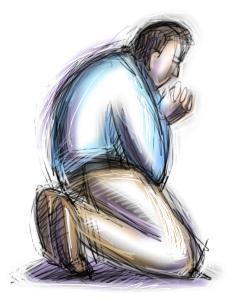
About 100 years ago there was a famous author in Scotland named Dr. James Beattie, a man of great learning and deep faith. He taught his little boy Jimmie how to read and write his own name when he was still very young, but even more than that, he taught him about God. To make this lesson even more vivid, Dr. Beattie secretly went out into the garden one day and traced his son’s name in the soil with his finger; then he sowed mustard seed in the lines he had traced. A few weeks later Jimmie came running up to him and exclaimed, “Father, father, my name is growing in the garden.” Dr. Beattie pretended to disbelieve this amazing news, claiming there must be some mistake, but his son insisted he come to the garden and see. Sure enough, there, in beautiful green letters, was the name “James Beattie.” “Well,” Dr. Beattie said, “I guess you name just appeared there by chance,” but Jimmie objected, “Oh, no, it could not come there just by chance; someone must have put it there.” The father smiled at his son’s wisdom, put his arm on his shoulder, and told him that the earth was filled with flowers and trees and birds—all created by God. All these beautiful things, he explained, were God’s way of writing His Name, so that we could know everything didn’t happen just by chance, but as a result of love. Dr. Beattie also explained to his wide-eyed son that God had made him and all the other children in the world, and that the Lord cared for them even more than for all the beautiful things in nature (Tonne, Stories for Sermons, Vol. 6, #157). This was a lesson Jimmy never forgot, and it’s a lesson Jesus wants us to remember and live by, as well. There are living reminders all around us of God’s Fatherly care for us, and only by accepting this truth, and building our lives upon it, can we hope to be truly happy.
If we were to list and compare all our personal faults and failings, I suspect one item that would show up on many of our lists would be “paying too much attention to what other people think.” It’s very common to let ourselves be influenced by what others might say, or to refrain from doing something we know we should, out of fear of what people might think of us. St. Paul, fortunately, didn’t have that problem. In writing to the Corinthians (1 Cor 4:1-5)—some of whom had questioned his authority as an apostle—he stated, “It does not concern me in the least that I be judged by you or any human tribunal. . . . the one Who judges me is the Lord.” God is indeed our judge, and as St. Paul forcefully states, “He will bring to light what is hidden in darkness and will manifest the motives of our hearts. . . .” This is bad news for those who oppose Him and willingly choose to remain trapped in sin, but wonderful news for those who repent and turn to God as a loving Father. Similarly, the Prophet Isaiah (49:14:15) offers us the very beautiful reassurance that God’s love for us is even greater than a mother’s love for her child, while Jesus assures us in Matthew’s Gospel (6:24-34) that our heavenly Father knows what we need, and responds to our prayers with love and tenderness. All that’s required on our part is a sincere desire to place Him first in our lives.
There was an elderly Franciscan nun named Sister Rosemary who was always filled with a radiant spirit of joy and friendliness; even though her great empathy toward the poor with whom she worked gave her plenty of excuses for being anxious and concerned, no one could recall ever having seen her worried or upset. Someone once asked her how she could always be so hope-filled and trusting, and she gave credit to her parents, who taught her to be ever at peace in the presence of her Heavenly Father. She also mentioned a popular traditional hymn, saying, “The hymn started off, ‘O Lord, I am not worthy,’ but for years I thought the words were, ‘O Lord, I am not worried!,” and she added, “Actually, in our home, that was our attitude toward the Lord and toward life” (Jim Forest, The Ladder of the Beatitudes, p. 119). That’s a wonderful outlook on life—and one that doesn’t come easily or naturally to most of us. In fact, if we want to find reasons to be anxious or worried, we will almost always be able to do so very easily. Most of us have to choose to be confident and trusting, and this will often seem to be beyond our ability—but it’s never beyond God’s. In all things, we must rely upon His strength, not our own, turning to Him in our needs and reminding ourselves of His care for us. This involves three things in particular.
First of all, we must specifically ask God for what we need, whether of a physical, spiritual, or emotional nature. If we’re lonely, there’s nothing wrong with praying that God will send us someone to be our friend; if we’re in poor health, it’s quite legitimate to pray for healing and strength, and if we’re having financial difficulties, the Lord wants and expects us to present those needs to Him in prayer. It is very important, however, that we not pray, as some people do, only when we need something; we must also pray regularly to praise and thank God, to express sorrow for our sins, and to intercede on behalf of others. These additional reasons for praying show that our prayer is genuine, not selfish, and thus much more likely to be effective. Secondly, in addition to praying for what we need, we must do what we can to address or solve our problems. As a loving Father, God is not going to let us sit back and do nothing; He expects us to grow as persons, to use our talents and abilities, and to try our best, all the while asking for His guidance and assistance. There is some truth to the saying that “God helps those who help themselves.” He also helps those who can’t help themselves, as long as they’re at least willing to attempt to do what they can. Thirdly, in order to be sure of receiving the Lord’s help, we must have the proper priorities. Jesus tells us very clearly that we cannot serve God and money, and that in order to receive His assistance in our material needs, we must “seek first the Kingdom of God and His righteousness.” If Heaven is our ultimate goal, everything else will fall into proper place, and when it’s truly our desire to please God, He takes great delight in blessing us.
Jimmy Beattie, and Sister Rosemary, were both fortunate to have parents who taught them to know and love God as a Heavenly Father, and this made a lasting difference in their lives. In the same way, we too must learn to thank God in a spirit of love for all our blessings and turn to Him in all our needs. Developing this sort of trusting relationship with our Creator is probably the greatest thing we can ever do for ourselves, and the surest way of finding that peace and freedom for which we were created.








